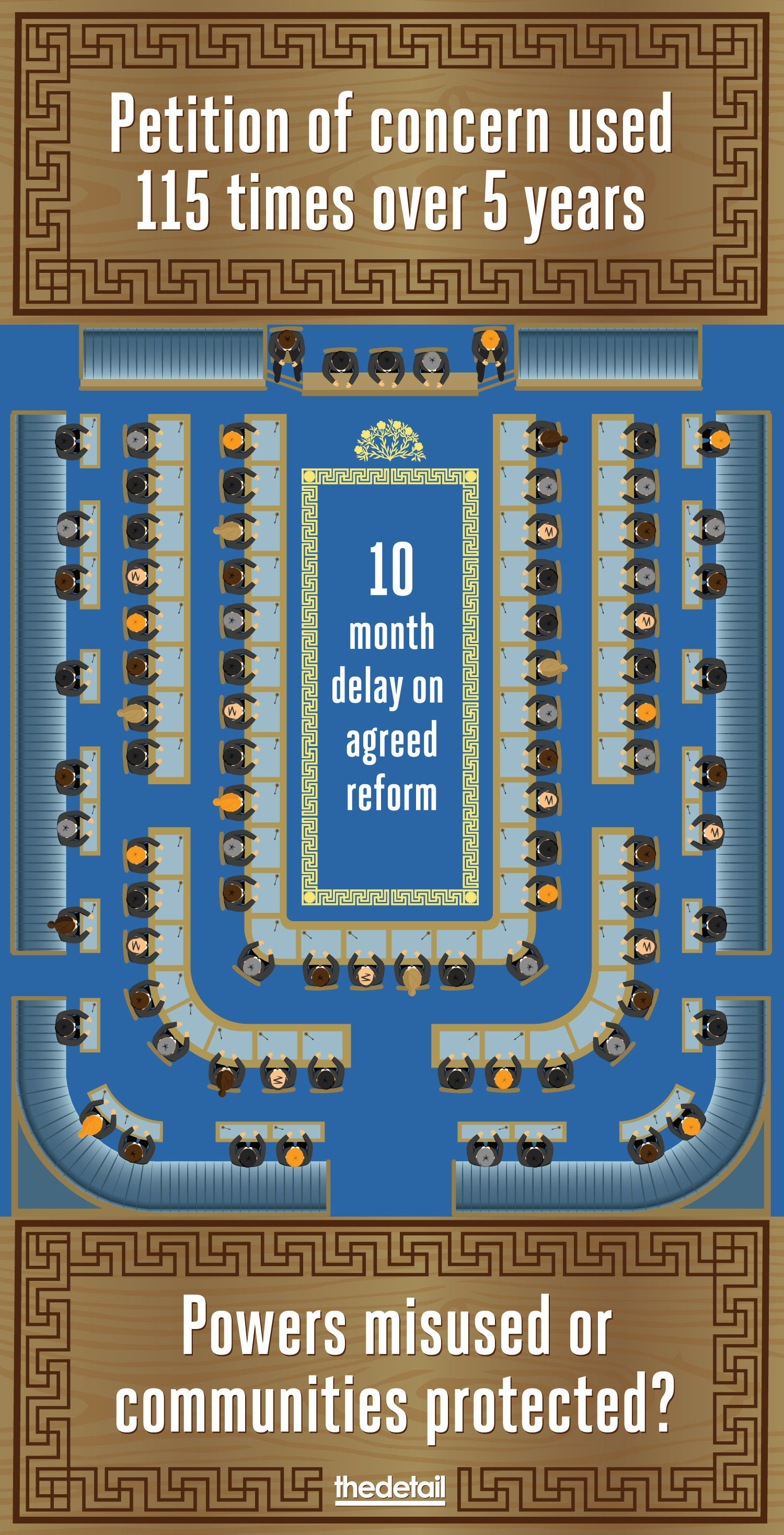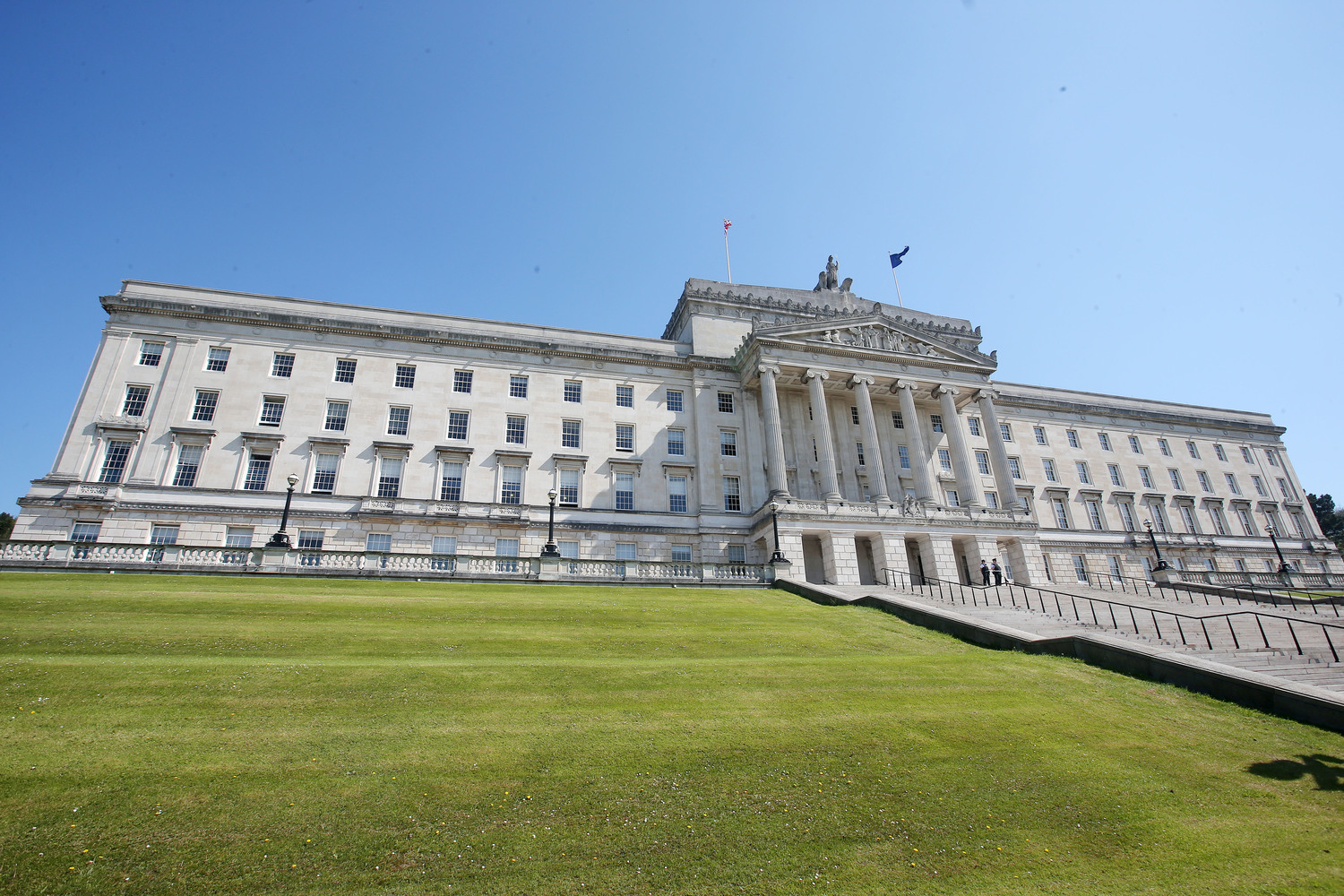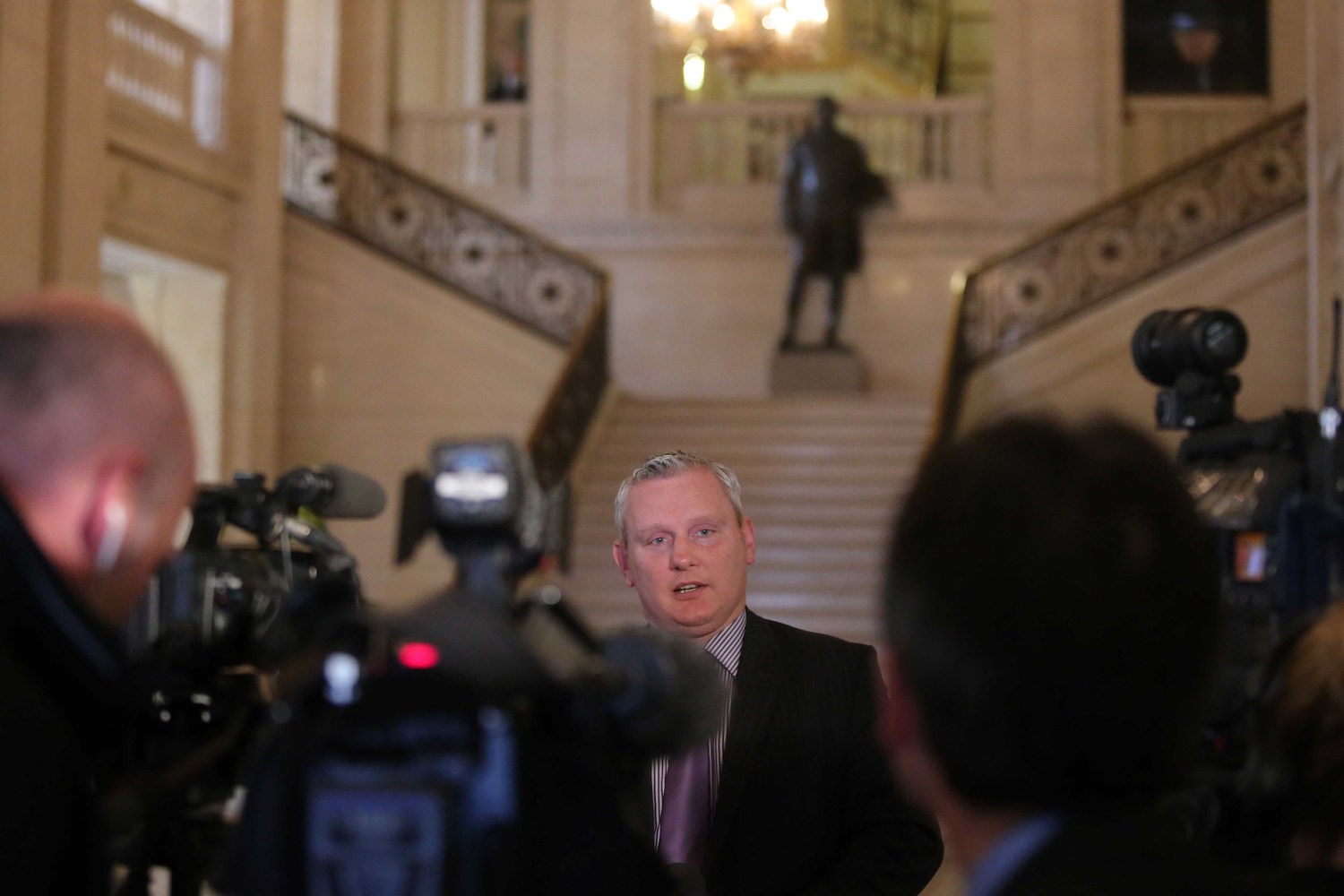POLITICIANS used a Stormont veto designed to prevent discrimination of one community over another 115 times during the last Assembly term.
The petition of concern mechanism, which was introduced after the Good Friday Agreement in 1998, must have at least 30 signatures to succeed and is meant to ensure that contentious legislation can only be introduced with cross-community support.
An analysis by The Detail has found that MLAs used the veto powers on 31 separate proposed bills and motions during the 2011 to 2016 electoral term, including on marriage equality, welfare reform legislation, as well as on three occasions when politicians faced reprimands.
The majority [84%] of the vetoes related to just 14 pieces of proposed legislation which involved the blocking of multiple amendments.
The DUP used the powers the most, with its members signing 86 petitions of concern, while the second highest use was by the SDLP and Sinn Féin whose members each signed 29 petitions of concern.
In a further development, while the Fresh Start Agreement promised that new guidelines on petitions of concern would be referred to the Assembly speaker by December 2015, it has been confirmed that the DUP/Sinn Féin administration has yet to make the change ten months later.
An Assembly spokesperson confirmed: “No such protocol has been referred to the speaker and any questions about this should be referred to the signatory parties.”
The DUP and Sinn Féin declined to comment on the delay.
Former Assembly member John McCallister, who tabled legislation that effectively became the vehicle for the creation of an official opposition at Stormont, had also pushed for changes in petitions of concern.
“We now have a clearly defined government and opposition, so we should have less need for petition of concern because the government should be acting as a more coherent unit,” he told The Detail.
“There’s much more of a will to have that collective style of government rather than Sinn Féin and the DUP at each other’s throats.”
Queen’s University Belfast law lecturer Dr Alex Schwartz, who has examined the use of the petitions, said: “It’s not so much the frequency of use but the kind of use that is the problem.
“I think if it does persist in the same way it has, being used to block matters for legislative change for reasons not to do with a specific community interest, then I think something more serious would be required to fix the problem but I’m probably withholding judgment for a while.”
Click here to see a list, compiled by The Detail, of petitions of concern tabled during the 2011-2016 Assembly mandate as well as those who signed them.
WHAT IS PETITION OF CONCERN?
A petition of concern can make it harder for new laws to be approved as it triggers a requirement that the proposed legislation can only be introduced with cross-community support.
Whereas a majority vote is normally needed before bills are implemented, a petition of concern means 60 per cent of the chamber and 40 per cent of both unionist and nationalist representatives must accept it.
At least 30 MLAs must sign the document which can delay a vote in the Assembly by at least 24 hours after it is submitted.
The DUP is the only party which exceeds that threshold, meaning other parties must work together to block measures they oppose.
Last year saw the highest number of petitions of concern ever tabled when the veto was used 60 times, though that was largely attributed to the proposed welfare legislation.
The figures show the DUP used the powers the most, with its members signing 86 vetoes.
The party tabled 82 of these alone, while its remaining four were co-signed by the SDLP and UUP.
Green Party leader Steven Agnew supported four petitions while four Alliance Party members signed three vetoes.
A DUP spokesperson said: “The petition of concern is currently a legitimate mechanism for use within the Assembly structures. While that is the case we will continue to use it when it is deemed appropriate.”
These figures outline the number of times each party has had members sign a petition of concern. As some documents were signed by more than one party, there will be some overlap which is why the total number of petitions in this table amount to more than the total number tabled during the last mandate.
Two vetoes to amendments in the Justice Bill were signed by NI21’s Basil McCrea, who signed both, and Independent Unionist Claire Sugden who supported one.
A further three petitions of concern were tabled by Sinn Féin but they failed to attract the required 30 signatures so were not accepted.
The figures highlighted by The Detail today were compiled using data publicly available on the Northern Ireland Assembly’s website.
An Assembly Office spokesperson told The Detail it does not record which party tables a petition of concern as it is only concerned with the document attracting the required number of signatures.
As a result, The Detail had to manually match the signatures against party membership to establish which parties signed each petition. We presented these details to the parties to offer them a chance to check our findings against their own records.
Sinn Féin and Independent Unionist MLA Claire Sugden failed to respond to our several requests for comment.
The UUP highlighted an error on the Northern Ireland Assembly website which originally listed three petitions of concern signed by its members.
Before The Detail raised the issue, Ross Hussey MLA was wrongly listed as having signed a petition of concern in March 2014, opposing an amendment to the Local Government Bill which supported the flying of flags on council buildings. An Assembly spokesperson blamed an administrative error for the mistake.
Click here to see the full responses from the political parties that answered our request for comment.
A list of the top ten proposed motions and legislation subject to petitions of concern during the 2011-2016 Assembly mandate.
Click here to see an extended version of the above table.
CONCERNS OVER USE
The mechanism has faced criticism over perceived abuse. For example, the DUP has persistently used petition of concern to veto same-sex marriage proposals.
This is despite a small majority of the 108 MLAs voting in favour of a change in the law in November 2015, by a margin of 53 to 52.
More than 20,000 people subsequently signed a petition against the DUP block which was presented to Stormont on Tuesday, September 20.
The majority of the petitions of concern used against last year’s welfare reform bill were tabled by the DUP, with the party opposing 47 proposed amendments.
However, Sinn Féin and the SDLP were later accused of being ‘reckless’ by Alliance Party leader David Ford after they used the veto powers to block the changes at the final stages of the legislative process. Green Party’s Steven Agnew also signed the petitions. All three parties said they did so over concerns about the impact of the legislation on their constituents.
Revised welfare reforms were eventually agreed in last November’s Fresh Start Agreement. Legislation was subsequently approved by the House of Commons.
In June, the Northern Ireland Assembly Commissioner for Standards, Douglas Bain, who investigates complaints against MLAs, called for petition of concern to no longer be used to stifle inquiries into politicians’ conduct.
The veto has been used to prevent sanctions being imposed against Sinn Féin’s Gerry Kelly and against the DUP’s Sammy Wilson.
Mr Kelly was given an informed warning by the PSNI in 2014 after an incident during which he was carried on the bonnet of a police Land Rover after a parade the previous year.
Mr Wilson was found to have broken rules governing MLAs’ conduct when he called TUV leader Jim Allister a ‘thug’ during a meeting of the Committee for Social Development in 2014.
The committee was considering allegations of political interference in the Housing Executive which was itself the focus of two petitions of concern in 2013 and the following year.
The veto powers were also used to prevent a sanction against the DUP’s Jim Wells which would have excluded him from the Assembly for seven days in 2012 after he was found to have broken the MLAs’ code of conduct during altercations with former Culture Minister Caral Ni Chuilin, and her then adviser, Mary McArdle, at Stormont.
In a statement to The Detail, Mr Bain called for politics to be kept separate from complaints made against MLAs.
“The public is entitled to a complaints process under which appropriate sanctions are imposed on MLAs who are found guilty of misconduct,” he said.
“Since my appointment as the Northern Ireland Assembly Commissioner for Standards in September 2012, five MLAs have been found guilty of misconduct but petitions of concern were used to prevent the imposition of any sanction on three of them.
“Party politics should play no part in any complaints process. To help restore public confidence in the Assembly the use of petitions in relation to conduct issues should end.”
Click here to see the full responses from the political parties that answered our request for comment.
ASSEMBLY REVIEW
Three options for reforming how petition of concern is used were proposed to a Stormont committee reviewing the mechanism in 2014 by an academic at Queen’s University, Belfast, who drew on the experiences of other divided societies including Bosnia-Herzegovina and Macedonia.
Law lecturer Dr Alex Schwartz said the scope of the veto could be limited to certain matters where discrimination is feared; linked to themes such as with human rights and equality matters; or opened up to scrutiny by the courts or the Assembly speaker.
Dr Schwartz said: “You could categorise issues into camps: things like legacy of conflict, symbols, emblems, flags, culture and identity. These seem to be the kind of things you would expect the procedure to be used for.
“All of those times it has been used for legislation simply because members of the Assembly disagree as a matter of policy with certain legislative initiatives, to the extent they don’t seem to have a clear bearing on specific nationalist or unionist issues, are examples of when it was used inappropriately. Another example is blocking scrutiny of members of the Assembly.
“It’s not so much the frequency of use but the kind of use that is the problem.
“I think if it does persist in the same way it has, being used to block matters for legislative change for reasons not to do with a specific community interest, then I think something more serious would be required to fix the problem but I’m probably withholding judgment for a while.”
Some critics claim the powers are often used inappropriately and disrupt legislative decision-making.
However, in his 2014 research paper, Dr Schwartz highlighted the fact the Assembly enacted 86 laws since powers were reinstated in 2007 while the Scottish Parliament, which has no equivalent veto, passed just 15 more during the same timeframe.
The review of petition of concern by Stormont’s Assembly and Executive Review Committee emerged from its 2013 review of D’Hondt, Community Designation and Provisions for Opposition, after which it agreed to look at the veto.
The committee’s findings, published in March 2014, considered the possibility of restricting use of the powers or adjusting the number of signatures required for the veto to be enacted.
The committee also looked at the potential for replacing the mechanism with an alternative, such as a weighted-majority vote of 65 per cent for example, and whether it should be subject to scrutiny by an Ad Hoc Committee on Conformity with Equality Requirements.
None of the proposed amendments were met with consensus from the committee.
FUTURE USE
Former independent MLA John McCallister proposed amending how petition of concern is used during early discussions on his private member’s bill which eventually paved the way for the official opposition that is now in place at Stormont.
Reacting to the figures compiled by The Detail, he said: “If you give somebody a tool or weapon of any kind then they are going to use it. No-one’s hands are completely clean.
"The DUP are worse than others simply because they have the numbers but no-one is completely clean when you look at what they are using it for and who they are protecting. For example, welfare reform isn’t something that only affects one side of the community but it came down to a unionist/nationalist split.”
Mr McCallister suggested removing the cross-community consensus aspect of the veto which would instead trigger a weighted majority vote on the motion it has been used on. He also wanted to introduce a requirement that at least three parties had to sign the petition of concern before it is accepted.
These proposals were eventually scrapped from the Assembly and Executive Reform (Assembly Opposition) Act before it was made law in March.
Mr McCallister, who co-founded the NI21 party in 2013 before his departure the following year, added: “Two parties in government rather than five, that’s why we will see more agreement between the parties in government and fewer petitions of concern.”
The Fresh Start Agreement, which was published last November and signed by former DUP First Minister Peter Robinson and Sinn Féin deputy First Minister Martin McGuinness, included new guidance for using petition of concern which it stated ‘the signatory parties have agreed to’.
It added: “While the signatory parties acknowledge the voluntary nature of their commitment, they will honour their obligations under this protocol in good faith at all times.”
The commitments include only tabling a petition of concern in ‘exceptional circumstances’ and, where one is used, outlining how the proposed legislation could be damaging if approved.
The Fresh Start Agreement also stated the protocol should be put before the speaker within one month of the report’s publication last November but this has not yet happened.
There is also no mention of the revised guidelines in the latest standing orders for the Assembly which were last amended in March.
An Assembly spokesperson said: “The Fresh Start Agreement is an agreement between the signatory parties. The Fresh Start Agreement document includes, at Appendix F3, a protocol governing the use of the petition of concern.
“Paragraph 58 of the Fresh Start Agreement states that the protocol will be referred to the speaker within one month of the date of this agreement. However, no such protocol has been referred to the speaker and any questions about this should be referred to the signatory parties.”
Click here to see a list, compiled by The Detail, of petitions of concern tabled during the 2011-2016 Assembly mandate as well as those who signed them.
 By
By





